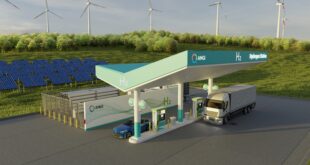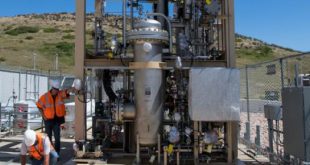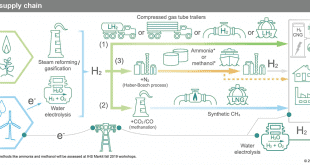It is said that Hydrogen cars are the way of the future. Today, the world is crippled by its need for oil, and its dependency on the Middle East for those fuels.
Cars that use Hydrogen for fuel use either a fuel cell based technology or an internal combustion engine.
The History of Hydrogen Fuel Celled Cars.
Swiss Christian Friedrich Schönbein developed the principle of the fuel cell and published it in the January 1839 edition of the ‘Philosophical Magazine.’ William Grove is credited with having invented a method, using the information from Schönbeins article, to mix hydrogen and oxygen through the use of an electrolyte in 1839. However, while this did produce some energy, it did not produce enough to be seen as useful.
Fuel cell research by the Germans in the 1920s made the concept of a carbonate cycle and oxide fuel cells to be thought of as being an alternative source of energy.
There is a debate as to where the term ‘fuel cell’ originated. It is said to have come from either Ludwig Mond and Charles Langer, or William Jaques. Mond and Langer attempted to combine the gas from industrial coal with air in 1889. William Jaques who is noted to have been the first to use phosphoric acid in an electrolyte bath as part of the ‘fuel cell’ process.
In 1932, Francis Bacon started to research fuel cells and discovered a less expensive catalyst than the previously used platinum. Bacon discovered that using a corrosive alkaline and nickel electrodes were effective enough to move research forward as it become more economically feasible. Bacon demonstrated the success of his fuel cell research in 1959 with his ‘Bacon Cell.’
Since Bacons work in the 1960s, Fuel cell technology has grown exponentially, as it is seen more and more as the fuel of the future.
For example, men like Stan Meyer, an American inventor, became concerned about the ability of a little country in the Middle East to control the United States and Western economies, and he began to experiment with what he saw to be the worlds most available resource: water (hydrogen). Stans water powered engines are noted as revolutionary, and threaten to topple a vast empire of gasoline and oil based companies.
Today, it is both possible to buy a hydrogen powered car, and to convert your car to hydrogen based fuel, which costs on average between $2,500 and $5,000.
How do Fuel Cells Work?
Hydrogen fuel cells are very much like car batteries. They have two electrodes, an anode and a cathode, that are separated by a membrane. Hydrogen from a fuel tank come into the cell and is split by a catalyst on the electrode anode. This action creates a movement of electrons that generate electricity, which is used to power the vehicle. The electrons of the hydrogen ions move through the membrane to the cathode electrodes where they chemically combine with oxygen from a compressor, producing both heat and water.
Fuel cells are said to be more efficient than combustion engines. Fuel cells also are more ecologically sound as they emit only heat and water. Another nice feature of the fuel cell is that it never needs to be changed for the life of the car.
The Future of Hydrogen Cars
Hydrogen is seen as the number one source of fuel in the future. Despite all that has been said for solar and wind power, hydrogen appears to be the answer. Government grants exist in many countries to improve the hydrogen based fuel, and push the auto industry into Hydro car manufacturing mode, and away from fossil fuels. This is pleasing those pushing for cleaner air, as the only known emissions from the car are water and heat.
Unfortunately, there is a large lobbying factor against this concept. Major oil companies and automobile companies are not happy with the concept of moving away from the standard gasoline fuels. It is expected that should there be such a move to hydrogen based fuels, oil companies may go bankrupt and there may be less of a need for cars as the fuel cells are expected to last the life of the car.
The future most likely will go the way of hydrogen based fuel. Watch for it to be the focus of energy within the next 20 years.
Stevo Lim
Vehicleride.com is the place to find all your informations about cars, car reviews, car loans, car safety, future cars, hybrid cars, hydrogen cars, solar cars, sports cars, concept cars and many informations about cars.
 Alternative Energy HQ solar power for homes, wind energy, and bio fuel issues
Alternative Energy HQ solar power for homes, wind energy, and bio fuel issues





